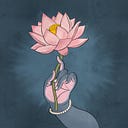Murugan in Tamil Poetry
The great drums beat
As Asura warriors marched
Their burning rage cut asunder
Corpses scattered
Scorched with a spark From your radiant smile
O leader of men
With leat-edged spear
Lover of Valli the gypsy
O lord who resides on Tiruttani hills!
(Aruṇakirinātar, Tiruppukal 5.71)
Transl. S. Kokilam
The priests worship him with elaborate rites and ceremonies, the rustic with meal and blood offerings, the aboriginal invokes him also with dances in the primitive manner of the woods. The philosopher meditates on him in silence, adoring him as the Supreme God, Subrahmaṇya, — the all pervading spirit of the universe, the Essence from which all things are evolved, by which they are sustained and into which they are involved — who in gracious pity for humanity takes form sometimes as the youthful God of Wisdom, God also of war when wicked asuras have to be destroyed, sometimes as the holy child Muruka, type of perennial, tender beauty, always and everywhere at the service of his devotees. Murukan (“the tender child”), the youthful god of victorious war, is ubiquitous in Tamil writing and culture; he is present in the earliest classical poems of Tamil as well as in the ruby-red and sea-blue and golden songs of Aruṇakiri as well as in the very recent prayers to Murugan by A. K. Ramanujan.
Lord of the last-born
give us
birth.
Lord of lost travellers,
find us. Hunt us
down.
Lord of answers,
cure us at once
of prayers.
— Prayers To Lord Murugan by AK Ramanujan
His wars are not only victorious, but just. He destroys evil, decay, and death. His smile is the light of life and eternal youth. As stated in the classical Tamil devotional poem Tirumurukāṟṟuppaṭai composed by Nakkīraṉãr on Murugan, “His face shoots forth myriad rays of light, removing darkness from the world” ( 91–92).
In the Tirumurukāṟṟuppaṭai, literally meaning “Guide to Lord Murugan”, the devotee or the bhakta is directed to the different manifestations and the various shrines of god the God. The poem is held in very high esteem not only by Murukan worshippers for whom it is the most ancient and fundamental text, but by all Śaivites. The poem is based on the intimate connection between a particular place of worship and the god’s localised manifestation. It has six parts of unequal length: the first describes the beauty of Murugan, the killing of Surapadma, the excellence of Madurai and Tirupparaṅkuṇṟam; in the second, the six faces of Murugan and their functions are described along with the temple in Tiruccīr; the third part deals with the shrine in Tiruvāviṉaṉkuti, the fourth with the temple in Tiruvērakam, in the fifth the poet narrates the sports of the god in the hills, the sixth describes the shrine in Paḷamutirccōlai. Murugan has two wives; the senior, Teyvayāṉai, is the daughter of Indra; the younger is “the beautiful daughter of the hunters, little Vaḷḷi, with creeper-like slender waist. The god’s priest is called vēlaṉ, “he who wears the spear”; and the men in the jungle drink in the god’s honour liquor prepared from honey matured in bamboo. But in his temples, there are also the dvijas, the twice-born, wearing the sacred thread of three bands. The Vedas and the sages also find mention, fusing local and Vedic culture into one inextricable pantheon.
The whole poem seems to be aglow with red, the colour of Murukan; images of blood are frequent (e.g. “pure white rice mixed with the blood of a fat strong ram with stout legs”’ is brought as an offering to the god); Murukan’s body glows like the sun rising from the emerald sea — the peacock which the “red god” rides; celestial damsels, blessing the cock-banner of the youthful god, have bright, rosy, tender feet
and the hills grow the kāntaḷ flowers red like fire; and across his handsome wide chest run red lines.
“Like the sun seen in the sea,
the delight of the world praised by men,
he is the dazzling light
visible from afar
even through eyes which are closed.
His feet are strong.
They destroy ignorance and support his friends.
His mighty arm rivals the thunderbolt.
It has crushed his fiends.
He is the bridegroom of the maid
whose front is fair and who is gently chaste.
The forests, cool and fragrant after first showers,
pouring down from gigantic clouds,
pregnant with waters sucked up from the sea,
scattering heavy drops upon the firmament
whose darkness is dispelled by the sun and the moon.
The forests, darkened and overspread
by the dense leaves of the red kaṭampu tree.
He has a garland of its flowers rolling on his chest.
High on the mountains towering into skies unearthly maidens dance.
They have bright, rosy, tender feet with tinkling anklets.
Rounded shanks and gently swaying waists.
Broad luscious shoulders and thin garments red like Indragopa’s wings.
Their mounds of venus bear
brilliant girdles strung with many shining gems.
How lovely are they!
With a beauty made not by the skill of human hands
set in Jambū gold and glowing, gleaming bright with flawless lustre
shooting beams afar.”
Adapted from Zvelebil, Kamil. The Smile of Murugan on Tamil Literature of South India. Netherlands: Brill, 1973.
Additional references:
Arunachalam, P. (1924). THE WORSHIP OF MURUKA or Skanda (the Kataragam God) with an account of an ancient Tamil Lyric in His praise and Side-lights from Greek Religion and Literature. The Journal of the Ceylon Branch of the Royal Asiatic Society of Great Britain & Ireland, 29(77), 234–264. http://www.jstor.org/stable/43483765
__________________________________________
If you find value in my work, become a patron or make a contribution via UPI to hindu.aesthetic@okicici. Hindu Aesthetic requires a lot of time and effort and your support would mean that I can continue bringing you the best possible content. ❤
Links to other social media here: hinduaesthetic.com
